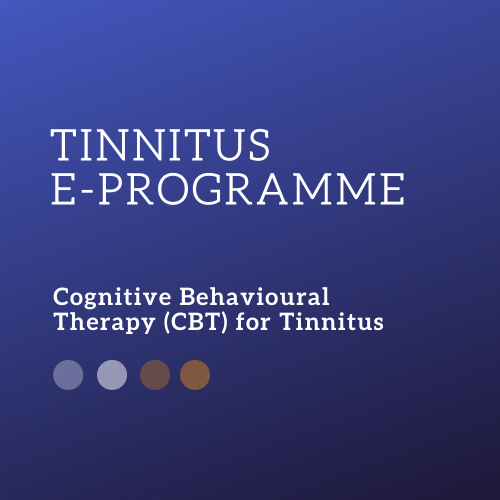What is tinnitus?
Tinnitus is an individual’s perception of a sound that does not have an external sound source. The experience of tinnitus is different for everyone. It may sound like ringing, roaring, buzzing, hissing, crickets, pulsing, or humming. It can be continuous or come and go. It can vary in loudness under different circumstances. It can be heard in one or both ears, or in your head. Most people find that they can continue their normal day-to-day activities without being disrupted by tinnitus. However, a small percentage of people with tinnitus report it as severely affecting them.
Tinnitus is very common and is reported in all age groups, even young children. About 30% of people will experience tinnitus at some point in their lives but the number of people who live with persistent tinnitus is approximately 13% (over 1 in 8). Tinnitus is more common in people who have hearing loss or other ear problems, but it can also be found in people with normal hearing.
While we do not know the exact answer to what causes tinnitus, we know that it is not a disease or an illness. It is generally agreed that tinnitus results from some type of change, either mental or physical, not necessarily related to hearing, but we cannot predict who will develop tinnitus and who won’t, when exposed to the same conditions.
Some of the common causes of tinnitus are:
- Hearing loss
- Ear wax blockage
- Stress and anxiety
- Exposure to loud noise
- Ear infections
- Head and neck injury
- Some medications
- TMJ disorder
If you are experiencing tinnitus because of a physical injury to your head or neck, have accompanying sudden hearing loss, and/or extreme anxiety or depression, please seek medical advice immediately.
You should also seek medical advice if you have tinnitus in one ear, tinnitus that pulses with your heartbeat, you have ear pain or drainage/discharge from your ear, and/or vertigo.
In some cases, treatment or reversal of the underlying cause can resolve the tinnitus (e.g. treatment of an ear infection), however, there is no cure for tinnitus specifically. Be mindful of ‘miracle cures’ available online. They tend to be expensive and ineffective, and disappointment from their failure can cause further distress.
'No cure' does not mean 'no relief'
Research has shown that over time, the noises reduce to a bearable level for most people, or they have long periods where it essentially disappears (unless they consciously focus on hearing it). This is because the brain loses interest and stops checking the signal. This process is called habituation. The length of time this takes varies from person to person – but it does happen.
There are self-help and professionally guided techniques available to make tinnitus more manageable and promote the process of habituation.
Self-help strategies for tinnitus relief

Gather Information
The more you learn about tinnitus and your own hearing health, the better equipped you are to reduce its negative impact on your life. Seeing an audiologist or GP (ideally with in interest in tinnitus and hearing health) is a great place to start.
There is also a vast amount of information online. We highly recommend limiting your research to trusted and evidence-based sources of information rather than forums and personal accounts, which may contain distressing content or make un-proven or dangerous medical claims.
Some excellent resources can be found here:
Sound Therapy
People who have tinnitus often report that it is more noticeable and bothersome in a quiet environment, and that listening to other sounds can make it less intrusive. The use of any sound to reduce tinnitus awareness or reduce the distress associated with it can be classed as sound therapy.
Listening to constant white noise or ‘shaped’ noise (named by colour), environmental sounds like rain or fan noise, or music/audiobooks, can help to reduce your perception of tinnitus by masking it with ambient sound, provide distraction, and encourage habituation. Some people use sound therapy specifically to assist with concentration or to fall asleep, while others use it during daily activities to provide relief.
There are so many was to access and customise therapeutic sounds to suit your needs. Often, all you need is your smartphone. There are Apps specifically developed for people with tinnitus that contain a wealth of information and resources (including noise generators and guided meditation) for managing tinnitus (e.g. the Beltone Tinnitus Calmer App. Alternatively there are simple noise generator Apps like White Noise Lite (free on the App Store or Google Play) that contain a large catalogue of continuous soothing sounds.
If you are concerned about the sounds bothering people around you and you prefer not to use conventional headphones for any reason, there are alternatives. For example, bone conduction headphones are excellent if you need to maintain environmental awareness, are prone to ear infections, or wearing conventional headphones exacerbates your tinnitus. Pillow speakers or soft band headphones are also great options for using sound therapy for sleep without getting sore ears or tangled in cords.
* Any linked products are examples of available devices, not specific recommendations.
Physical Wellbeing
Stress, anxiety and poor sleep can make your tinnitus seem louder. Relaxation techniques such as breathing exercises, muscle relaxation or yoga can help to reduce the loudness of your tinnitus and lessen its impact on you.
Daily physical activity can also work wonders on reducing stress and anxiety, and promotes better sleep.

Professional help
Diagnose and remediate hearing loss
Tinnitus and hearing loss share many common causes, including loud noise exposure, ear infections, and head injuries (learn more about hearing loss). Chances are that if you have tinnitus, it is very likely that you also have hearing loss. Often, people blame their tinnitus for overpowering conversation and making it difficult to hear, but usually the hearing loss is the culprit. Visit an audiologist for a full diagnostic assessment to establish whether you have hearing loss, whether you need to seek medical treatment for an underlying ear health condition, and/or whether you may benefit from hearing aids to help you hear better and manage your tinnitus.

Using hearing aids to manage hearing loss can have a multi-faceted positive effect on your ability to manage your tinnitus:
Amplification of ambient sounds in the range of your hearing loss can mask the tinnitus, reducing tinnitus perception and its negative impact on your daily activities
Improving the audibility of important sounds can reduce listening effort and fatigue
Improving access to clear speech and other enjoyable sounds like music, facilitates social interaction and engagement in enjoyable activities
Most hearing aids can also be used to stream audio from mobile phones and other Bluetooth devices, allowing you to access your favourite music or sound therapy sounds on the go.
Seek treatment for sleep problems
Being well rested can help to ease physical and emotional stress, which may lessen the perceived loudness of tinnitus. However, many people notice their tinnitus more when they are tired or when they are trying to go to sleep. This can contribute to the development of sleep disorders. If you are finding that you are having difficulty falling asleep or staying asleep, see your GP for a management plan. Do not use over the counter sleep medications without medical consultation.
Cognitive Behavioural Therapy (CBT)
This is one psychological approach that can be useful in managing tinnitus by reframing our beliefs and behaviour to reduce the negative impacts of tinnitus.
Some beliefs and behaviours are helpful and that’s great – keep doing them! But some beliefs and/or behaviours are unhelpful and reinforce negative feedback cycles that are difficult to break. CBT helps you to recognise them, and then you work together with the clinician (usually a psychologist or specially trained audiologist) to find different ways of responding to the tinnitus so it becomes less bothersome. For example:
Scenario 1
Jane had a stressful day at work and when she went to bed that night her tinnitus was louder than usual. She found herself focussing on her tinnitus wishing it would go away so that she could sleep (unhelpful behaviour). This led her to feel anxious and agitated, and she couldn’t fall asleep for several hours. As soon as she woke up in the morning, she listened for her tinnitus and was distressed to know that it was still there. She blamed her tinnitus for her lack of sleep and worried she would never get to sleep easily again (unhelpful belief). Her anxiety caused her to lose focus during the day and arrive home even more stressed than the night before (negative feedback loop).
Scenario 2
Jane had a stressful day at work and when she went to bed that night her tinnitus was louder than usual. She remembered learning that stress can make tinnitus worse. She believed she would feel better after a restful night’s sleep (helpful belief). She turned on some relaxing music to mask the tinnitus, and practiced some deep breathing techniques to help her to relieve some stress (helpful behaviour). She fell asleep easily and woke feeling refreshed and ready for the day. It took her a few hours to realise that her tinnitus had reduced, and she hadn’t noticed it that day (positive reinforcement).
CBT for Tinnitus E-Programme
The CBT for Tinnitus E-Programme (est. 2009) has been uniquely designed and implemented by Debbie Featherstone, a fully qualified and highly experienced Hearing Therapist, dual qualified in Psychotherapy. It is for those distressed by tinnitus, simultaneously providing a cognitive, behavioural framework that enables users to reduce co-existing symptoms such as: anxiety, low mood/depression, and sleep problems.
This course has a strong evidence base of effectiveness over 12 years. The results and reviews speak for themselves! Debbie is located in the UK, but her course is available online internationally. You have the option of 1, 2 or 3 face-to-face consultations via teleconference (Zoom), in addition to a 12 stage program with support via email and interactive tools.
For more information, visit the website.
Tinnitus Retraining Therapy
This is a very structured approach to managing tinnitus. Basically, TRT assumes that the tinnitus has been prioritised by your brain as an important signal requiring constant attention and monitoring.
TRT uses sound generators and counselling to attempt to retrain how the brain processes sound so that you habituate to the tinnitus. Most people working in the tinnitus field will use elements of TRT, but the strict method is not frequently used because there is limited evidence for its effectiveness.
Staying well physically and mentally is key to managing tinnitus. Try to eat healthily, only drink alcohol and caffeinated beverages in moderation, exercise regularly and get enough sleep. Keeping your body healthy and mind active and occupied with enjoyable or interesting activities will keep you on the road to minimising its effect on your life.
If you are concerned about tinnitus, support is available.
Contact us to arrange an assessment of your hearing and tinnitus.




